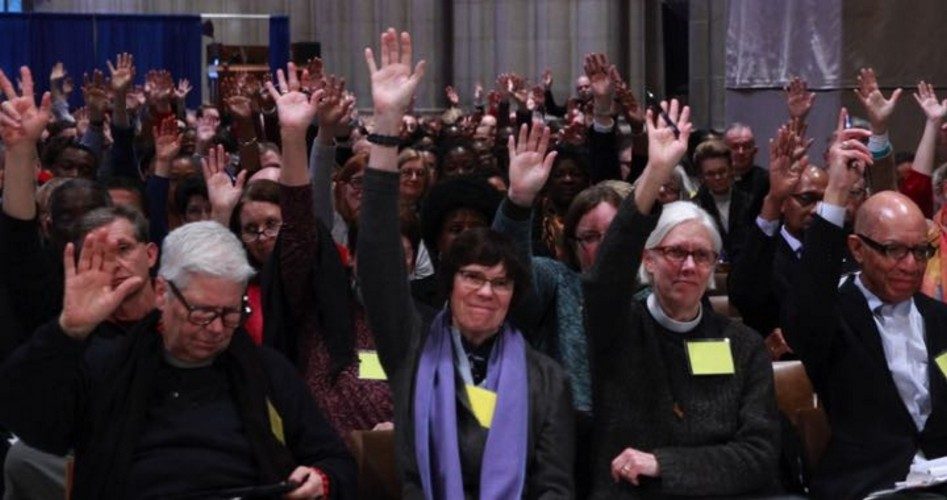
The Episcopal Church in Washington, D.C. has voted to limit the use of pronouns that refer to God as masculine, and to become more “inclusive” of transgendered individuals.
During the 123rd Diocesan Convention at Washington National Cathedral, delegates approved a resolution regarding future updates to the denomination’s august Book of Common Prayer, resolving to “eliminate, when possible, all gendered references to God and to replace them with gender neutral language, and if necessary, to alternate gendered titles when referring to God.”
An amendment to the resolution stipulated that if a “revision of the Book of Common Prayer is authorized,” the D.C. diocese would insist that the update “utilize expansive language for God from the rich sources of feminine, masculine, and non-binary imagery for God found in Scripture and tradition and, when possible, to avoid the use of gendered pronouns for God.”
The theologically challenged drafters of the resolution explained that “over the centuries our language and our understanding of God has continued to change and adapt. Our current gender roles shape and limit our understanding of God. By expanding our language for God, we will expand our image of God and the nature of God. Our new Book of Common Prayer needs to reflect the language of the people and our society.… Language should not be limited by gendered pronouns when avoidable.”
One feminist clergy “person,” Linda R. Calkins of St. Bartholomew’s Episcopal Church in Laytonsville, Maryland, went as far as to recommend that her denomination embrace the “non-sexist” Inclusive Bible, a labored effort to sanitize Scripture of gender references.
Addressing her fellow delegates, Calkins declared, “I am still waiting for the Episcopal Church to come to the place where all people feel that they can speak God’s name. Many, many women that I have spoken with over my past almost 20 years in ordained ministry have felt that they could not be a part of any church because of the male image of God that is systemic and that is sustained throughout our liturgies. Many of us are waiting and need to hear God in our language, in our words and in our pronouns.”
The diocese also passed a resolution encouraging parishes in its jurisdiction “to remove all obstacles to full participation in congregational life by making all gender-specific facilities and activities fully accessible, regardless of gender identity and expression.” In plain language, the D.C. diocese is embracing the increasingly blurred and bizarre definitions of sex and gender that the LGBTQ community is trying to foist on society.
“Fixed boundaries of gender identity are being challenged and churches need to respond,” insisted the drafters of the resolution. “This resolution is a clear response to the systematic oppression and violence that transgender people experience on a daily basis.”
It is not surprising that, like other mainline denominations that have cut their ties to Holy Scripture and Orthodox Christian traditions, the Episcopal Church in America is losing members at a furious pace. According to the Institute on Religion and Democracy (IRD), the denomination continued “a sustained decline in 2016 to 1,745,156 domestic members.” And while losses were not as discouraging as in recent history, the American Episcopals still lost 34,179 members in 2016, a decline of 1.9 percent, with the closure of 37 parishes across the nation.
The IRD added that the denomination “continues to see church size shrink, with the average Episcopal parish attracting 57 worshipers on a Sunday, down from an average of 64 in 2012. Similarly, 71 percent of the denomination’s churches have an attendance of fewer than 100 persons, while less than 4 percent attract 300 or more. The trend lines do not bode well for the future, with 58 percent of congregations experiencing decline of 10% or greater in the past five years. In contrast, only 16 percent of congregations grew their attendance by 10 percent in the same time span.”
Photo of convention: Screenshot of Episcopal Diocese of Washington

